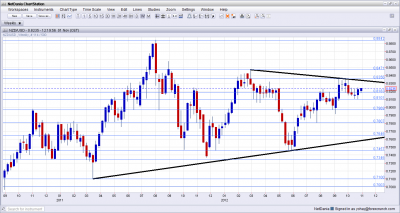The New Zealand dollar consolidated some gains and even dropped a bit, as expected in the October outlook. During November, the kiwi faces key quarterly reports, and could remain stable, or tick upwards.
Here are some factors to look out for regarding NZD:
* This article is part of the November monthly forex report. You can download the full report by joining the newsletter in the form below.
- The new governor of the RBNZ, Graeme Wheeler made his first decision, and it resulted in a relative positive statement. New Zealand is less sensitive to commodity prices, and demand for food remains good.
- The most important indicator released in November is the quarterly employment report – New Zealand differs from many countries – it publishes the report only once per quarter. New Zealand enjoys a relatively low unemployment rate of 6.8%. Any rise above 7% will weigh on the pair, but stability or even a drop in these turbulent times could boost the kiwi.
- It is also important to note the quarterly PPI report and quarterly retail sales. The rise of 1.3% in sales (accompanied by a rise of 1% in core sales) in Q2 was significant for the NZD.
- The kiwi didn’t suffer too much from the QE3 Aftermath – some other currencies retreated against the US dollar despite dollar printing. This makes the kiwi well positioned for some gains.
Intervention?
Intervention: Each time NZD/USD rises, the RBNZ releases a complaint about the high value hurting the economy. This is usually disregarded by the markets. For a change, and with some correlation with their Australian counterparts, it seems that policymakers might be considering an intervention.
Many large countries either intervene directly in the value of their currencies (China, Brazil, Switzerland and Japan) or indirectly by various forms of QE: the US and the UK, as well as the ECB in a limited form. Intervention in foreign exchange markets is far from imminent, but is not ruled out anymore. This development is very interesting. The benchmark for intervention still remains very high, but it is out there – something that didn’t exist beforehand.
So, this talk could also influence the value of NZD/USD, but it is still hard to imagine an intervention with current values. A rise above 0.90 could make it more serious.
NZD/USD Technical Outlook

NZD/USD traded within the lower part of the range, in a month that saw a retreat. Downtrend resistance, which began early in the year, remains important. Also note the long uptrend support line, which began in early 2011.
Lines
The round number of 0.90 is in uncharted territory. The float-era high of 0.8842 is the ultimate resistance line.
0.8470 was the peak in 2012 and remains key resistance. 0.8360 was a very impressive cap to the pair during September 2012 and is a key line on the upside.
0.8175 worked well as support during September 2012 and is only minor now. 0.81 is the bottom of the current range, after working as such several times in recent months and also at the beginning of the year.
0.7975, which was a veteran peak back in 2010 returns to play a significant role as the pair stabilizes above the line. A loss would open the door for bigger falls. The round number of 0.78 worked as support in early 2011 and also in mid-2012 and is the next line.
0.7650 capped the pair on recovery attempts and also worked as resistance in 2009. 0.7450 was a stubborn bottom in May 2012 and was also a swing low in the fall of 2011.
0.7350 is significant on the downside. The pair got close to this line during Q4. The round number of 0.71 was a swing low in 2011 and a break lower would be a bearish signal. Under the round number of 0.70, the next line of support is 0.6815, which worked as such in early 2010.
